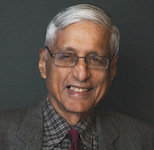"This engaging monograph should be read by everyone invested in upholding the constitutional norm of fraternity in our increasingly divided country."
India After 1947: Reflections & Recollections
"A timely study of the state of the nation from one of our foremost thinkers, India After 1947 is an essential read that reminds us of who we are as a nation and what we should aim to be."
Modern South India: A History from the 17th Century to our Times
'Modern South India' is a rich, authoritative and magnificent work of history about the South that will be read, debated and reflected upon for years to come.
Why Gandhi Still Matters: An Appraisal of the Mahatma’s Legacy
Close to 150 years after he was born, how relevant is Mahatma Gandhi? In India, he is revered as the Father of the Nation; his face still adorns currency notes, postage stamps and government offices; streets and welfare schemes continue to be named after him but has he been reduced to a mere symbol? Do his values, message and sacrifice have any meaning for us in the twenty-first century?
Understanding the Founding Fathers: An Enquiry into the Indian Republic’s Beginnings
In this thought-provoking book, award-winning biographer and historian Rajmohan Gandhi sets the record straight on the founding fathers as well as their great opponent, Muhammad Ali Jinnah. Along the way, he answers questions of perennial interest—Who was really responsible for Partition? Were Gandhi and Ambedkar enemies? Did the Mahatma weaken the country’s Hindus? Was he anti-Muslim? Should India have been a Hindu Rashtra? Could the Kashmir issue have been dealt with differently? Would Bose and Patel have led the independent nation better than Gandhi and Nehru?
Punjab: A History from Aurangzeb to Mountbatten
Researched in India, Pakistan and at the University of Illinois at Urbana-Champaign, Rajmohan Gandhi's latest book narrates a 240-year story of what old-timers know as undivided Punjab, beginning with the 1707 death of Emperor Aurangzeb and ending with the 1947 division into West Punjab and East Punjab.
A Tale of Two Revolts
Two wars––the 1857 Revolt in India and the American Civil War—seemingly fought for very different reasons, occurred at opposite ends of the globe in the middle of the nineteenth century. But they were both fought in a world still dominated by Great Britain and the battle cry in both conflicts was freedom.
Mohandas: A True Story of a Man, His People and an Empire
A candid recreation of one of the most influential lives of recent times, this book finally answers questions long asked about the timid youth from India's west coast
Ghaffar Khan: Nonviolent Badshah of the Pakhtuns
Rajmohan Gandhi offers fresh insights into the life and achievements of an extraordinary man, drawing close parallels with the life of Mahatma Gandhi, his 'brother in spirit'. Badshah Khan's unwavering commitment to nonviolence and Hindu-Muslim unity offers valuable lessons.
Understanding the Muslim Mind
A fascinating account of the Muslims in twentieth-century India, Pakistan and Bangladesh through his biographical sketches of eight prominent Muslims.
Rajaji: A Life
The definitive biography of free Indias first Head of State Chakravarti Rajagopalachari (1878-1972)
Revenge & Reconciliation: Understanding South Asian History
An original, provocative and compelling reading of the subcontinent’s history. In this remarkable study, well-known biographer Rajmohan Gandhi, underscoring the prominence in the Mahabharata of the revenge impulse, follows its trajectory in South Asian history.
The Good Boatman
An illuminating portrait of one of the greatest figures of the twentieth century. Mohandas Karamchand Gandhi has been the subject of over a dozen well-regarded biographies, yet key aspects of the man still prove elusive.
Eight Lives: A Study of the Hindu-Muslim Encounter
This book, published by the State University of New York Press, tells of eight prominent men involved in the politics of India in the period leading up to Partition.
